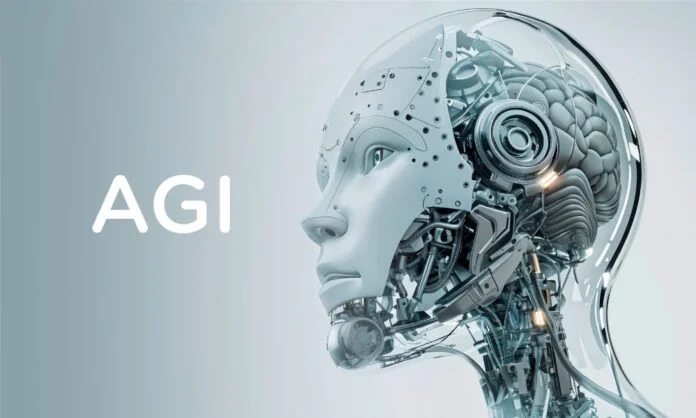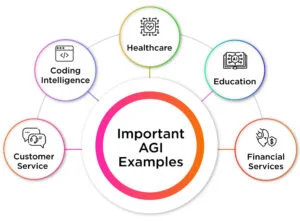The next development in artificial intelligence is called artificial general intelligence, or AGI. AGI seeks to replicate human cognitive skills so that it can handle complicated issues, adjust to unusual circumstances, and reason like a person, in contrast to existing AI systems that are excellent in specialized tasks.
In this blog we will cover the explanation of AGI, it’s possible uses, and the difficulties researchers confront in bringing it to fruition.
The Definition of Artificial General Intelligence
A computer that is hypothetically intelligent enough to comprehend or learn any intellectual work that a human being can is said to have artificial general intelligence (AGI). The goal of this kind of artificial intelligence (AI) is to replicate the cognitive capacities of the human brain.
As per the report, the market for artificial general intelligence is expected to reach a value of over $116 billion by 2035, up from $3.87 billion in 2024, at a compound annual growth rate (CAGR) of 36.25%.
Apart from the above-described fundamental features, AGI systems also have a few essential qualities that set them apart from other forms of AI:
Generalization Ability: By transferring knowledge and abilities from one field to another, AGI may efficiently adjust to novel and unfamiliar circumstances.
Knowledge of Common Sense: AGI can reason and make judgements based on its extensive knowledge of the universe, which includes relationships, facts, and social norms.
Computer science, neurology, and cognitive psychology are among the multidisciplinary disciplines working together to develop AGI. Developments in these fields are constantly influencing how we comprehend and develop AGI. AGI is still mostly just a theory and an objective that engineers and researchers are pursuing at the moment.
Important AGI Examples
#1 Customer Service
Suppose you have a customer service system that uses AGI. For effective and individualized service, it would integrate real-time analytics with a massive amount of consumer data. Using a thorough client profile that includes demographics, prior experiences, wants, and purchasing patterns, AGI may be able to foresee issues, customize replies, offer fixes, and even anticipate follow-up enquiries.
#2 Coding Intelligence
AGI understands the logic and intent of current codebases, going beyond code analysis to provide suggestions for enhancements and produce new code in accordance with human requirements. Artificial general intelligence may increase efficiency by offering a hardcoded knowledge of dependencies, architecture, and modification history.
#3 Healthcare
Today’s enormous medical data generation is still mostly unexplored. In order to spot small trends that humans would overlook, AGI may examine genetic data, medical pictures, and patient records. Through the examination of past data and medical patterns, AGI may be able to forecast a patient’s individual risk of contracting particular illnesses. To customize treatment approaches, artificial general intelligence may also examine a patient’s medical history and genetic composition. This individualized strategy may result in fewer harmful side effects and more effective treatments.
#4 Education
Envision an artificial intelligence instructor who customizes the learning process rather than delivering knowledge. A customized learning route may be created by AGI by analyzing a student’s performance, learning preferences, and knowledge gaps. Not every pupil would be treated equally.
Depending on how well a student understands the topic, AGI may modify the speed and level of difficulty in real time. Having trouble conceiving? Additional explanations and examples are given by AGI. Being an expert on a subject? It could introduce more difficult content. There may be more to AGI than just lectures and textbooks. To maintain student interest and motivation, it may provide individualized exercises, interactive simulations, and even gamified learning opportunities.
#5 Financial Services
AGI has the potential to transform financial analysis by surpassing conventional techniques. AGI may examine enormous amounts of data, including emotion on social media, financial news, and even satellite imagery, to spot intricate market patterns and possible disruptions that human analysts would miss. Financial institutions and startups are already developing and utilizing rudimentary versions of these technologies.
Large volumes of historical data might be processed by AGI, which could lead to ever more precise financial models for risk assessment and better investment choices. Complex trading algorithms that take into account emotion on social media, real-time news, and market data may be created and executed by AGI. Human oversight would still be essential for ethical concerns and final decision-making, though.
The Basic Difference Between AI And AGI
These days, artificial intelligence (AI) is a revolutionary force that is changing sectors including healthcare and finance. But the difference between artificial general intelligence (AGI) and artificial intelligence (AI) is not always obvious, which is frightening and confusing to people. While AGI is still in its early childhood, AI is made to be very good at some activities. It is an idea that could theoretically execute each intellectual work that a human being is capable of completing in a variety of activities.
Prime Challenges in Developing AGI
#1 Complexity and Diversity
Artificial general intelligence has difficulty comprehending and processing a wide range of data and activities, such as abstract thinking and languages. It needs to be able to handle subtleties and variations, which calls for sophisticated training in contextual awareness and natural language processing. A harmonious synthesis of subskills is necessary for human intellect, a complicated phenomenon.
#2 Uncertainty
The actual world is full of ambiguity, which human intellect skillfully manages. Despite possible contradictions, it makes conclusions using intuition, common sense, and probabilistic reasoning. But building such devices is still a very difficult modelling and computational task.
#3 Creativity
The ability to be creative, which involves imagination, inspiration, and aesthetics, is made possible by human intellect. It lets people express themselves, be creative, and have fun. Making a machine that can accomplish the same thing is a difficult task.
#4 Learning and Adaptation
The ability to learn independently and adapt to novel situations is made possible by advanced machine learning algorithms and neural networks. This allows AGIs to creatively absorb and use new knowledge, a job that is currently difficult for existing AIs.
#5 Ethics and Safety
Concerns about privacy, autonomy, and technological control become increasingly important as AGI develops. Safety research is being conducted to make sure human rights and values are upheld, especially in scenarios involving autonomous decision-making.
The Future of AGI and Connection to Super AI
Superintelligent AI, a kind of AI that not only replicates but also surpasses human intellect in every aspect, is already beginning to take shape, despite the fact that artificial general intelligence (AGI) is still a goal to be achieved. This shift presents several questions, including whether such intelligence should be governed, even while it remains speculative.
AGI – A Future Full of Possibilities and Responsibility
Artificial general intelligence (AGI) has the potential to revolutionize sectors including healthcare, education, and finance, but its advancement necessitates careful consideration of safety, ethics, and adaptability.
Despite being a work in progress, artificial general intelligence (AGI) is an exciting field of innovation because of its potential to change how humans interact with technology. Since AGI has the potential to redefine human development, its future is one to monitor.
Would you like to join us in exploring the future possibilities of Artificial General Intelligence! If yes, keep visiting us at YourTechDiet.
Read More:
Brief About The Reasons Why Artificial Intelligence is Dangerous


